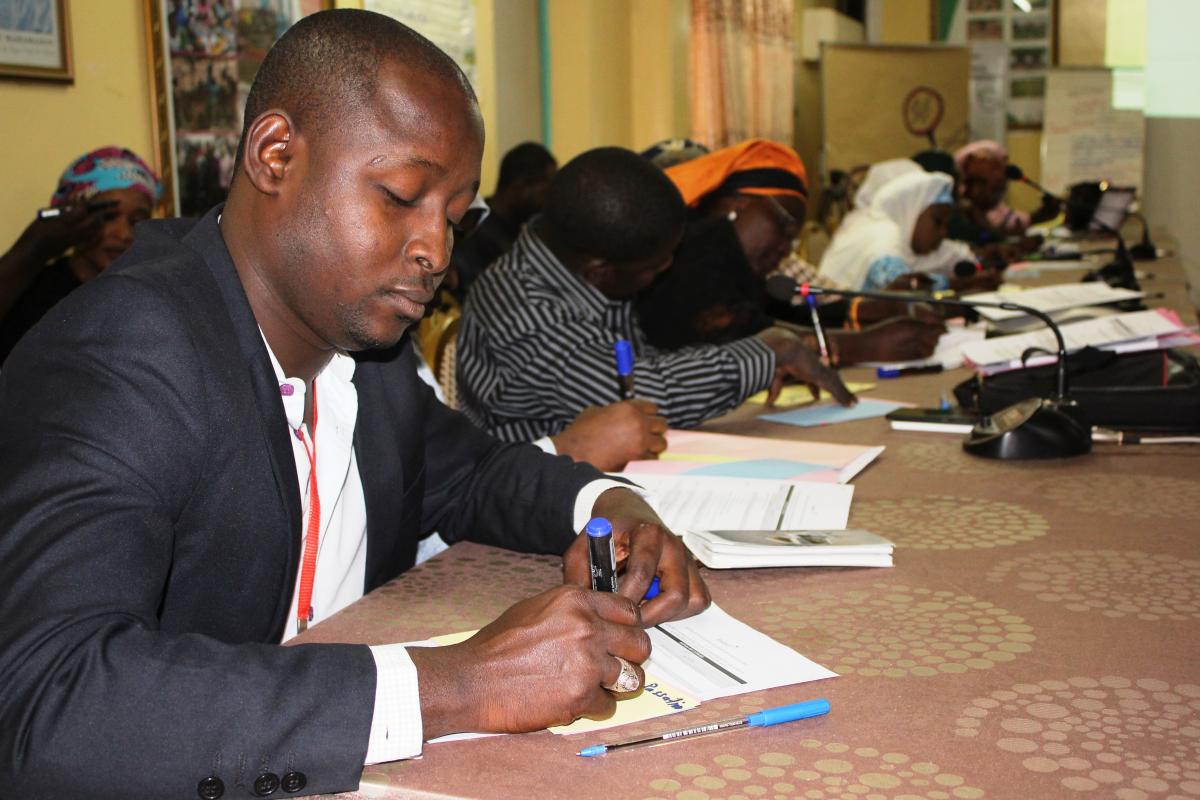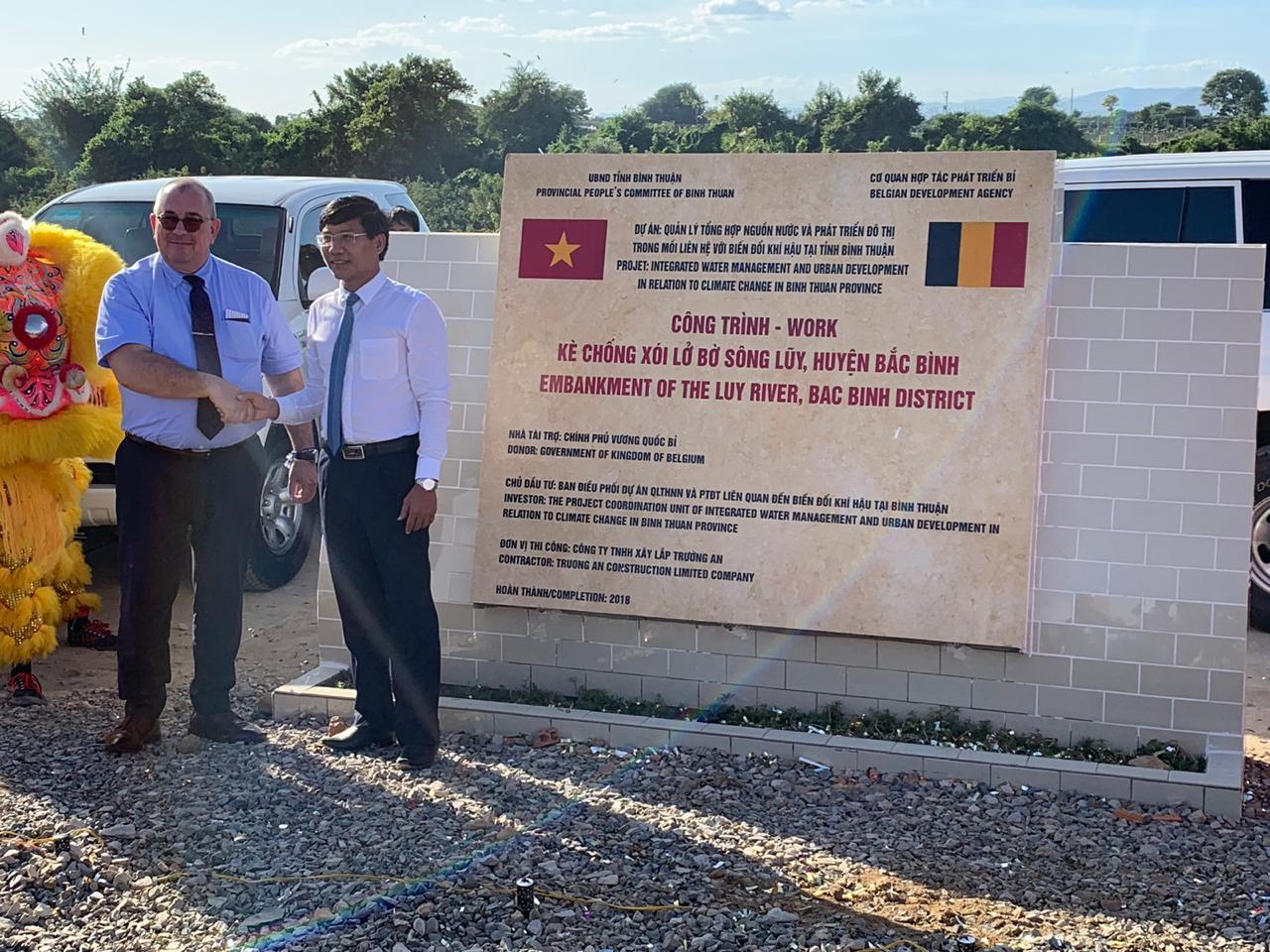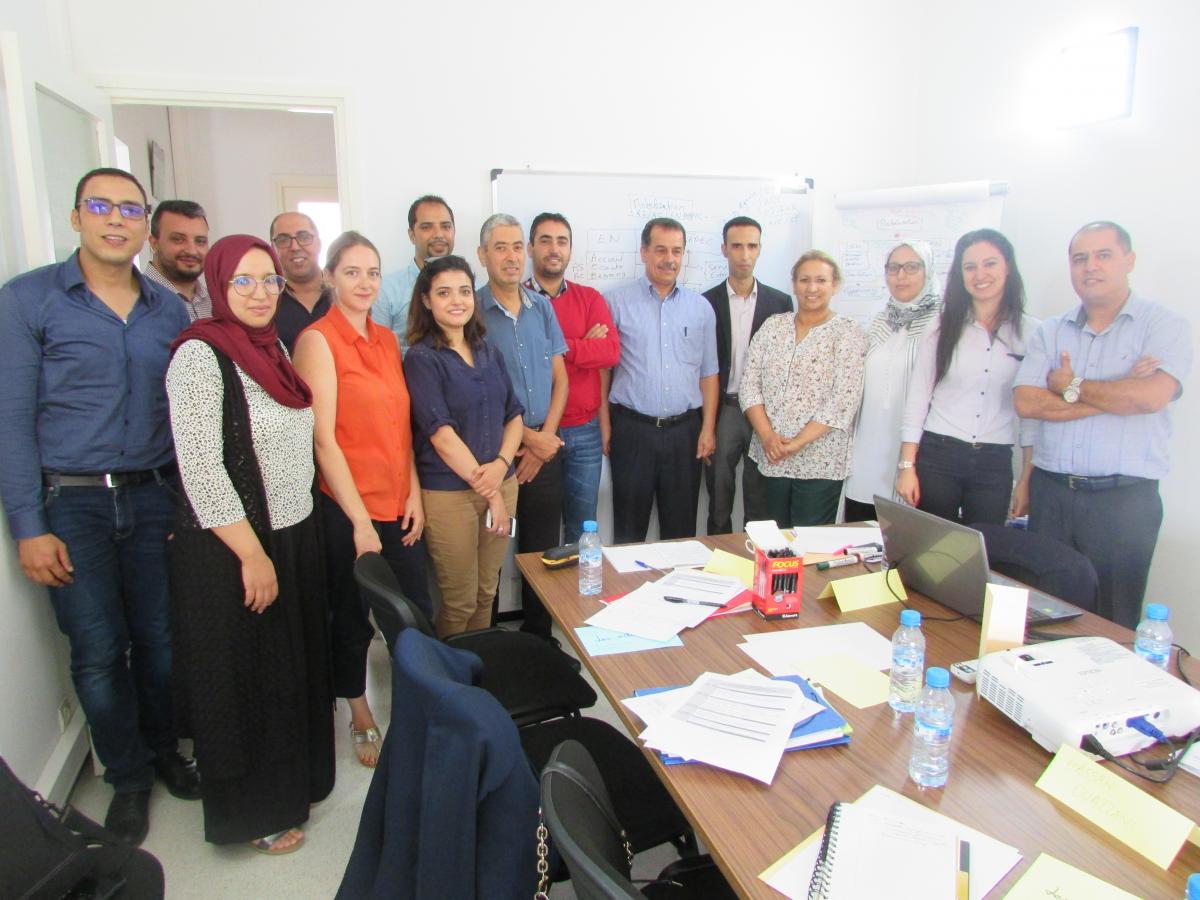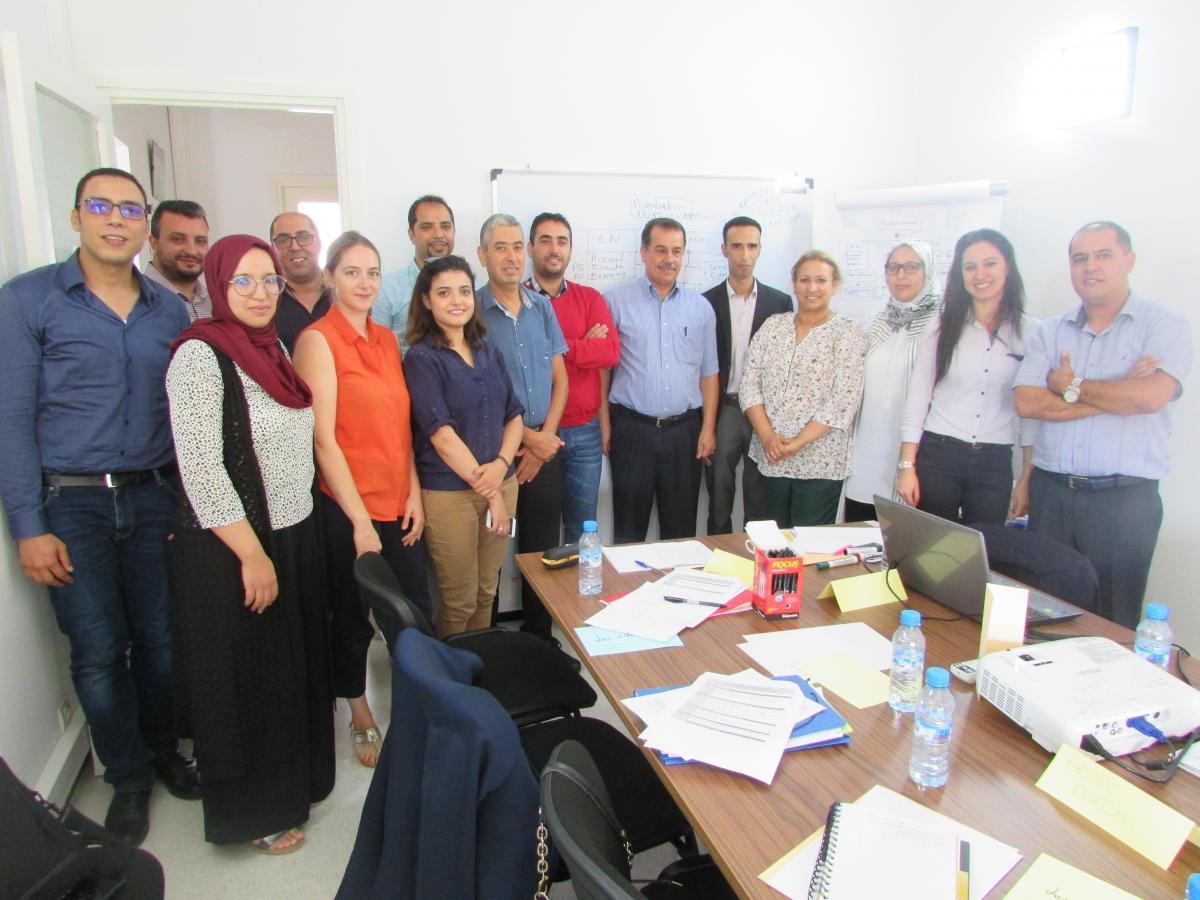Opzoeken
1800 - 1815 van 2520 nieuws bekijken
-
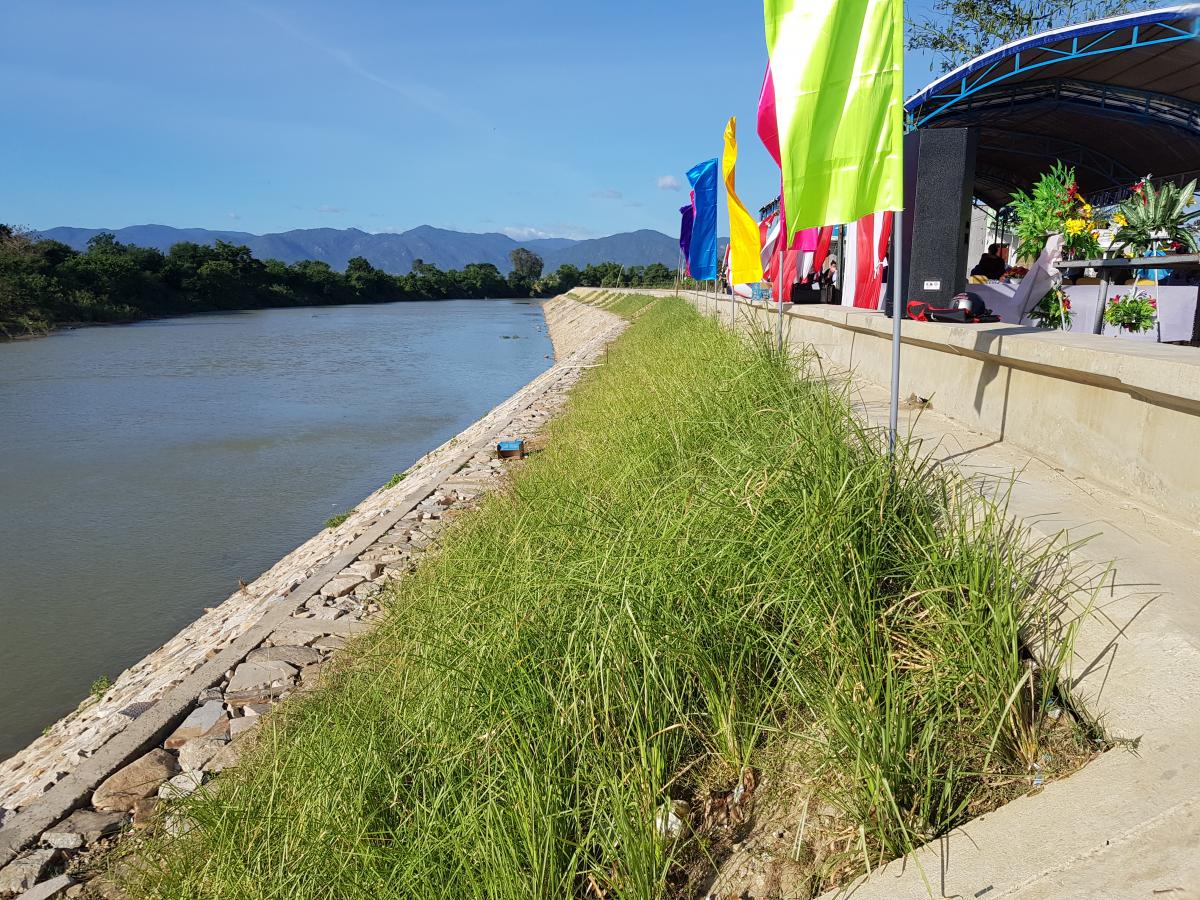
Belgian Ambassador at Inauguration Ceremony for River Bank Works in Binh Thuan
Ian WOOD | 24/01/2019
On 10 January 2019, the Provincial People’s Committee of Binh Thuan had the great honor to welcome Mr Paul Jansen, Ambassador of the Kingdom of Belgium, for the inauguration ceremony for completion of works to strengthen the embankment of the Luy River in Phan Thanh commune, Bac Binh District. The construction which helps to stabilize the river banks and reduce erosion risk was implemented under the Belgium-funded project of “Integrated water resource management and urban planning related to climate change in Binh Thuan Province”. Climate change and its contribution to flooding and river bank erosion are significant issues in Binh Thuan and this area along the Luy river in Ca Dien hamlet of Phan Thanh commune in Binh Phuoc hamlet of Cho Lau town were identified as high-risk for river bank instability. To prevent further erosion and to protect adjacent houses and valuable agricultural land construction works were implemented to protect 330m of river bank at Ca Dien Hamlet and 250m at Binh Phuoc. Implementation of the works was managed by the Project Coordination Unit of the Binh Thuan project along with the support of Enabel, the Belgian Development Agency.The ceremony was hosted by Mr Le Tuan Phong, Deputy Chairman of the provincial People’s Committee and attendance included representatives from the province’s departments and agencies, district and commune leaders and many local inhabitants who are the beneficiaries of the works.The total investment was 567,000 euro from Belgian funds and another 76,600 euro from other sources. Construction work consists of 330 metres of river embankment in Canh Dien hamlet and 250 metres in Cho Lau town. The construction includes concrete and rock reinforcement of the river bank plus a concrete road to enhance all-weather access. As a cost-saving measure and to enhance the aesthetics, the design incorporates reinforced vegetation sections at the top of the bank using Vetiver grass. This grass is known to be very resistant to erosion and this innovation provides demonstration of its effectiveness to provide a greener alternative for river protection works. When in operation, this project will help reduce erosion at the Luy river and protect people’s houses and crops. It will also help improve the travelling situation of the local residents, and protect the environment along the river. The works at Ca Dien Hamlet provide protection to 60 houses and the works at Binh Phuoc Hamlet provide protection to 40 houses. In total, the work will benefit about 3,000 residents, of whom 1,000 are living in the area nearby the work, and the other 2,000 are inhabiting the surrounding areas.
-
Le renforcement des capacités individuelles comme tremplin vers le développement socio-économique
Céline MEWISSEN | 21/01/2019
L’intervention renforcement des capacités (IRC) vise à accroître les performances des acteurs des secteurs de la santé et de l’élevage afin de contribuer efficacement au développement desdits secteurs. Elle vient en appui aux deux nouveaux programmes mis en oeuvre par Enabel : PASS et PRADEL. Le groupe cible de l’intervention comprend les acteurs étatiques, le secteur privé et les organisation de la Société Civile (OSC) pouvant influencer le développement dans les secteurs de la santé et de l’élevage.L’intervention IRC se base sur une approche novatrice pour adresser les besoins en renforce-ment organisationnel et institutionnel. Elle part de l’hypothèse qu’encourager les différents groupes d’acteurs dans leur performance organisationnelle, en se basant sur leurs rôles et fonctions respectifs, conduit à long-terme au développe-ment socio-économique.La porte d’entrée pour le renforcement des capacités est l’organisation qui est considérée comme «le moteur» du développement. Il s’agit de prendre sous la loupe les capacités institutionnelles et organisationnelles existantes, pour déterminer les capacités individuelles qui sont à renforcer afin de développer l’organisation. L'organisation est donc considérée comme un « capteur » de capacités individuelles afin de les transformer en performance organisationnelle.Le processus de renforcement procédera par analyses organisationnelles qui seront traduites en cartes de performances sur base desquelles seront élaborés des plans de renforcement des capacités (RC). La mise en oeuvre des activités de renforcement découlera d’une consolidation préalable en vue d’avoir une plus grande économie d’échelle. Cette consolidation prendra en compte les thèmes transversaux et prioritaires à savoir le genre, l’approche basée sur les droits humains, le changement climatique et la digitalisation.L’IRC vise également le développement d’initiatives innovatrices par des alliances stratégiques autour des thèmes spécifiques contribuant au développement des deux secteurs (élevage et santé). Il est attendu que le renforcement de capacités individuelles et les initiatives innovatrices puissent avoir un impact sur la performance des acteurs et sur la réalisation des objectifs sectoriels.
-
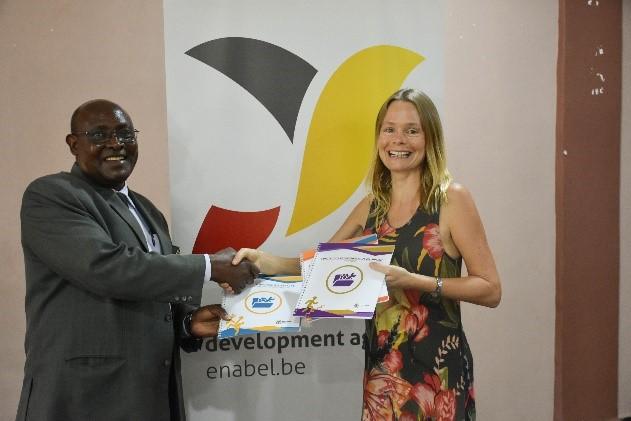
Enabel Provides Pedagogical Support to the National Teachers' Colleges
Dorothy KYAMAZIMA | 21/01/2019
The Teacher Training Education project continues to provide pedagogical support to improve the quality of teaching and learning within the NTCs. This time around the support is in the form of a set of guidelines that serve as essential tools to contribute towards preparing qualified and competent teachers. 600 copies of these guidelines and toolboxes were disseminated through-out the colleges and will be used by the NTC lecturers. These guidelines and toolboxes are categorized into three areas:·Continuous School Practice which is an innovative system that provides an opportunity for teacher trainees to get hands-on experience and teaching skills. CSP Guidelines: https://bit.ly/2Dp3cju CSP Toolbox: https://bit.ly/2FOUw7G Support Supervision System which targets the knowledge, skills, attitudes and practices of lecturers in order to improve their teaching and pedagogical roles in preparing qualified and able teachers. Support Supervision Guidelines: https://bit.ly/2R2eVZ8 Support Supervision Toolbox: https://bit.ly/2R5vvYd Continuous Professional Development System which supports continuous learning and training for teaching staff in NTCs to ensure that their professional skills and knowledge is advanced and incorporates up-to-date teaching styles relevant to providing quality education. CPD Guidelines: https://bit.ly/2DpDHyS CPD Toolbox: https://bit.ly/2T5NpMf
-

Enabel Launches an Electronic Vote Book Tool
Dorothy KYAMAZIMA | 21/01/2019
Enabel in partnership with the Ministry of Education and Sports launched a new Electronic tool with the aim of improving financial management across all 5 National Teachers’ Colleges in Uganda.The customized Excel Electronic Vote Book automatically extracts financial reports on a monthly basis and this encourages transparency in management of financial resources and enables accountability. This intervention is geared towards improving institutional development of National Teachers’ Colleges. Follow the link bellow to learn more: https://bit.ly/2Ef6Rmq
-
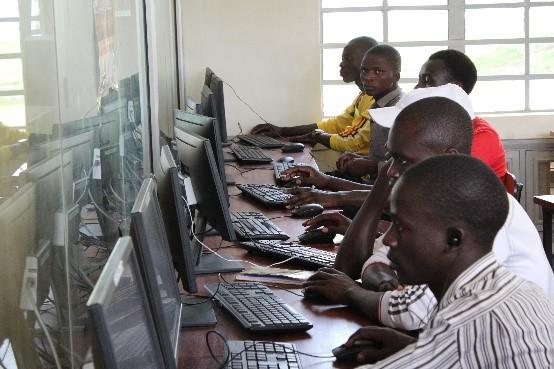
Integrating ICT in Teaching and Learning
Dorothy KYAMAZIMA | 21/01/2019
Information and Communication Technologies (ICT) has increasingly become an integral part of today’s education system and this is mainly because it has the potential to support many education functions such as teaching and learning, research, management and administration. Throughout the month of September 2018, the Teacher Training Education (TTE) Project equipped National Teachers’ Colleges with ICT equipment that is sure to improve teaching and learning within the classroom and provide more access to information for teacher trainees and NTC lecturers. These included: 46 computers, 26 laptops, 11 cameras, 61 tablets and 10 printers. This also included a library kit that comprised of printing and binding machines that were intended to back up the functionality of the library, making them more effective and capable of supporting both teachers and student’s needs. The TTE project in partnership with the Ministry of Education have taken steps aimed at fulfilling the long-awaited gap in relation to the shortages of ICT equipment in the Teachers colleges. The colleges are now in the right direction for enhancing the usage of ICT so as to promote its lecturers and students to fit in the 21st century with ease. Madame Ketra Lugumba the Assistant School Practice Officer at NTC Mubende had this to say. “The advent of Active Teaching and Learning in the colleges in 2014 is now being made a reality as it has received more enforcement particularly with the delivery of ICT equipment. With this, lecturers will be able to integrate ICT in teaching and learning for example in music when teaching ‘pitching’, the computer with a music software can give you the right pitching when going through a music ladder (d r m f s l t d’) and in Professionals Particularly Development Studies subject when teaching Neo colonialism the photographs of Kwame Nkurumah can be up loaded and shown to students to associate with the content being handled. ICT equipment will also ease typing at the college, facilitate easy administration of assignments, use the internet in daily lessons, facilitate self-learning, promote social networking, improved data storage (record keeping) and practical training. It also facilitates research undertakings and assessment, provides rich learning resources at the college with corresponding high outcomes as well as facilitating independent study efforts.” The college lecturers believe that Active Teaching and Learning will be consolidated further and run even more smoothly within the college with the purchase of ICT equipment and that it will produce high outcomes from both the teachers, students and surrounding communities.
-
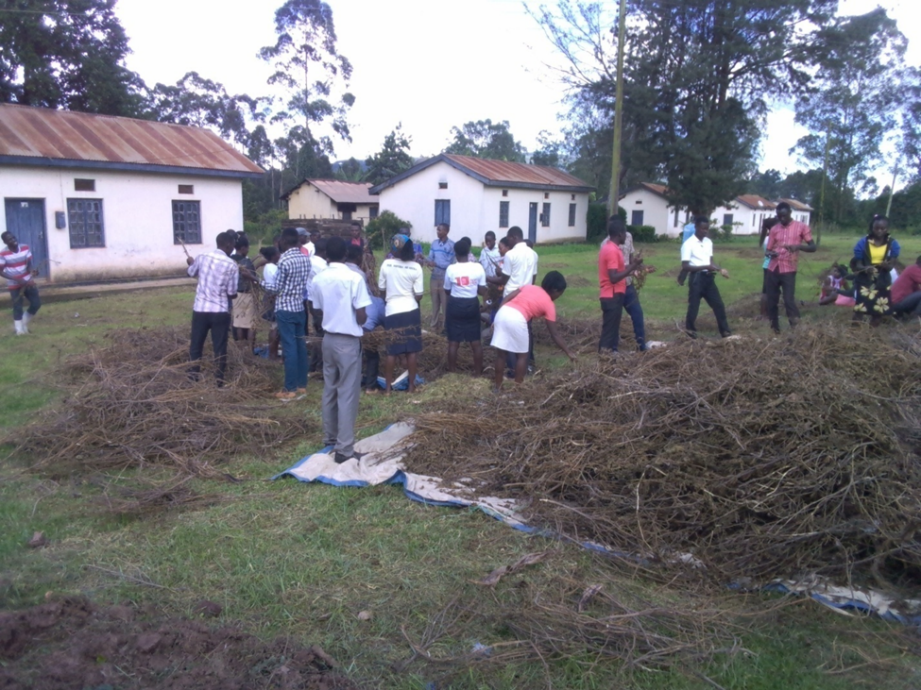
Investing in Pedagogical Projects for Teacher Development
Dorothy KYAMAZIMA | 21/01/2019
It has been observed that pedagogy can be enhanced outside the classroom and brought closer through student’s participation and practice in college projects. If the students are to participate in their own development and have a positive impact on the transformation of their communities as they grow, such projects are just the thing to expose them to the right experiences that will prepare them for action at all levels. With projects activities based on group levels, students can participate in different projects on daily basis and improve on their pedagogic skills. National Teachers’ College (NTC)Kabale has embarked on integrating pedagogic projects into their teaching process for the development of teacher practical skills and sustainability. These pedagogical projects include the usage of drip irrigation in farming, preparation of terraces and manufacturing organic manure after harvesting. Through this, students are exposed to practical experiences relevant to improving their skills which is suitable for their education. Students are also empowered to transform their communities by deriving appropriate solutions to community challenges through inculcating creativity and entrepreneurial skills to initiate and manage projects that are economically viable. Students are being taught skills which will transform them into trainers of other students and communities around the college and beyond. They are equipped with field research that can allow them to write research findings from real life practice and usage of scientific procedures. This pedagogic approach will not only contribute to clear understanding of basic research principles but will also in future guide students into opportunities of making professional choices in arts and sciences based on skills attained as well as teaching. It is intended that these projects will be run as enterprises for profit motive, so that the learners leave the college with minds of entrepreneurship, creativity and business innovation. It is expected that the initial capital will sustain the projects and also generate income continuously. The lessons learnt from these projects will enrich student’s knowledge and skills in handling their final examination especially in the area of field work projects and thereafter in teaching.
-
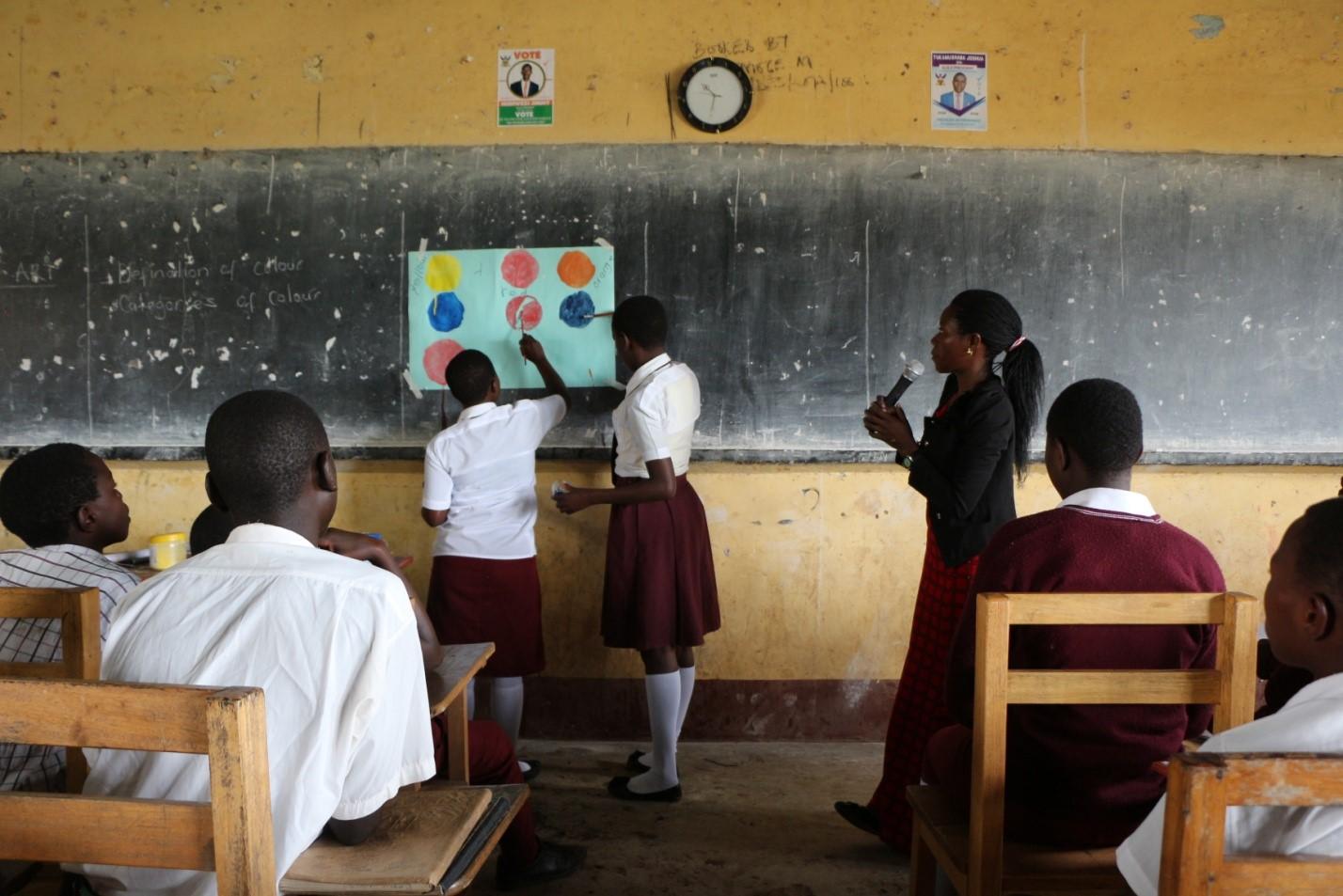
Active Teaching and Learning Takes Root in National Teachers' Colleges
Dorothy KYAMAZIMA | 21/01/2019
One of the main objectives of the TTE project implemented by Enabel in collaboration with the Ministry of Education and Sports is to improve the quality of teacher training by introducing a learner-centered approach to teaching known as the Active Teaching and Learning (ATL). This means that the learning systems shift focus from the teacher to the student and provoke independent reasoning, problem solving and critical thinking. Through ATL, students are more likely to retain a higher percentage of knowledge and skills because they engage with materials, participate in and out of the classroom and exchange information with their peers. School Practice Workshop Every year, National Teachers’ College (NTC) Mubende organizes a school practice workshop which brings together both students and teachers from the college and Partner Secondary Schools with the aim improving teacher education. The recent school practice workshops have focused on reflective discussions on the Continuous and Final School Practice activities, improving professionalism and skills in pedagogy. The school practice workshops initially emerged as a result of the need to develop strategies that recognize the training and preparation of student teachers to apply and perfect the teaching methods and techniques during and after the final school practice. It is also intended to refresh, inspire student teachers and enliven their school practice. This year’s school practice workshop gave room to a little friendly teaching competition that show-cased the skills of the student teachers and assessed their competences in lesson planning, use of teaching and learning resources and ATL methodologies. It is during this competition that student teachers are judged on how they applied Active Teaching and Learning techniques and a prize awarded to the best student teacher. Ms. Rebecca Nalumansi a student of Art and Design at NTC Mubende and prize winner of the recently concluded school practice workshop shares her story. “Before the competitions, we had adequate training from our lecturers and we were also given opportunities to practice through a series of micro-teaching lessons from nearby secondary schools like St. Susan and Christ the King Secondary Schools. Such instances not only developed our confidence but also gave us a chance to make improvements in the practice of teaching”, she said. She also stated that during the planning session for the contest, she considered a number of activities, methods, techniques and assessment modes that enabled active participation for her learners. “I am a better teacher because of the exposure I have had to Active Teaching and Learning methods and this is through the support of Enabel. I plan to be the best teacher always.”
-
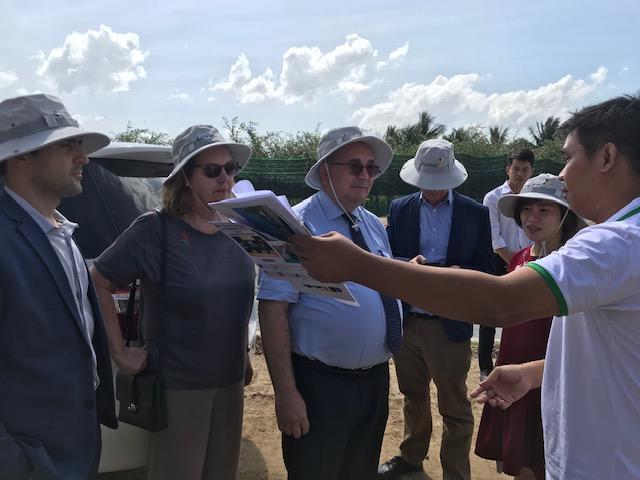
visit of Belgian Ambassador
Krista VERSTRAELEN | 17/01/2019
During his first visit to the province, Ambassador Paul Jansen was briefed on the ongoing construction works for the expansion and reinforcement of the Cau Ngoi Channel.
-
visit of Belgian Ambassador
Krista VERSTRAELEN | 17/01/2019
During his first official visit to the province, Ambassador Paul Jansen inaugurated on 10th January 2019 the riverbank strenghtening works along Luy River, Bac Dinh district.
-

Une formation sur-mesure pour des jeunes filles brillantes
Céline MEWISSEN | 15/01/2019
Le projet Sarraounia vise à améliorer les conditions de maintien des filles dans six collèges ruraux de la région de Dosso en sensibilisant notamment les communautés rurales cibles sur le genre et l'éducation. Depuis son lancement en février 2017, le Projet est expérimente une stratégie de sensibilisation novatrice axée sur la mise en œuvre d'actions concrètes au lieu des campagnes de sensibilisation de masse classique. La finalité de cette nouvelle approche méthodologique de "Valorisation du Changement Social" est double: d'une part, améliorer les aspirations scolaires des jeunes filles en récompensant les plus performantes d'entre elles et d'autre part, démontrer aux communautés les bénéfices tangibles de la scolarisation des filles. Dans ce cadre, six élèves en classe de quatrième et une élève en classe de cinquième s’étant particulièrement distinguées par leurs résultats scolaires et leur leadership durant l'année scolaire 2018-2019 ont bénéficié de deux mois de formation à Niamey. Encadrées par les ONG Bien-être de la Femme Rurale et DOUBANI, Aminatou, Attikatou, Hannatou, Zouley, Adama, Sahara et Leyhana ont assisté à des cours d’économie familiale, des séances d’information sur des thématiques essentielles à leur épanouissement ainsi que des formations en activités manuelles génératrices de revenus telles que la couture, la fabrication d’objets avec des perles et la fabrication de savons, pommades et parfums. Toutes ont pris l'engagement de mettre en application les nouvelles connaissances et compétences acquises en formant à leur tour d'autres jeunes filles qui le désirent au sein de leur collège. Les jeunes filles ont participé à des visites guidées, notamment à l'Institut de Formation en Techniques de l'Information (IFTIC) dont la directrice générale est une femme, afin de leur montrer des modèles de femmes leaders occupant de hautes fonctions administratives. À travers cette expérience unique, ces jeunes filles qui visitaient la capitale Niamey pour la première fois de leur vie ont découvert des réalités différentes de leur vie au village. Finalement, elles ont pris conscience de l'ampleur des inégalités de genre qui existent dans le cadre de leur scolarité et de l'enjeu de l'égalité des chances dans le secteur de l'éducation.
-
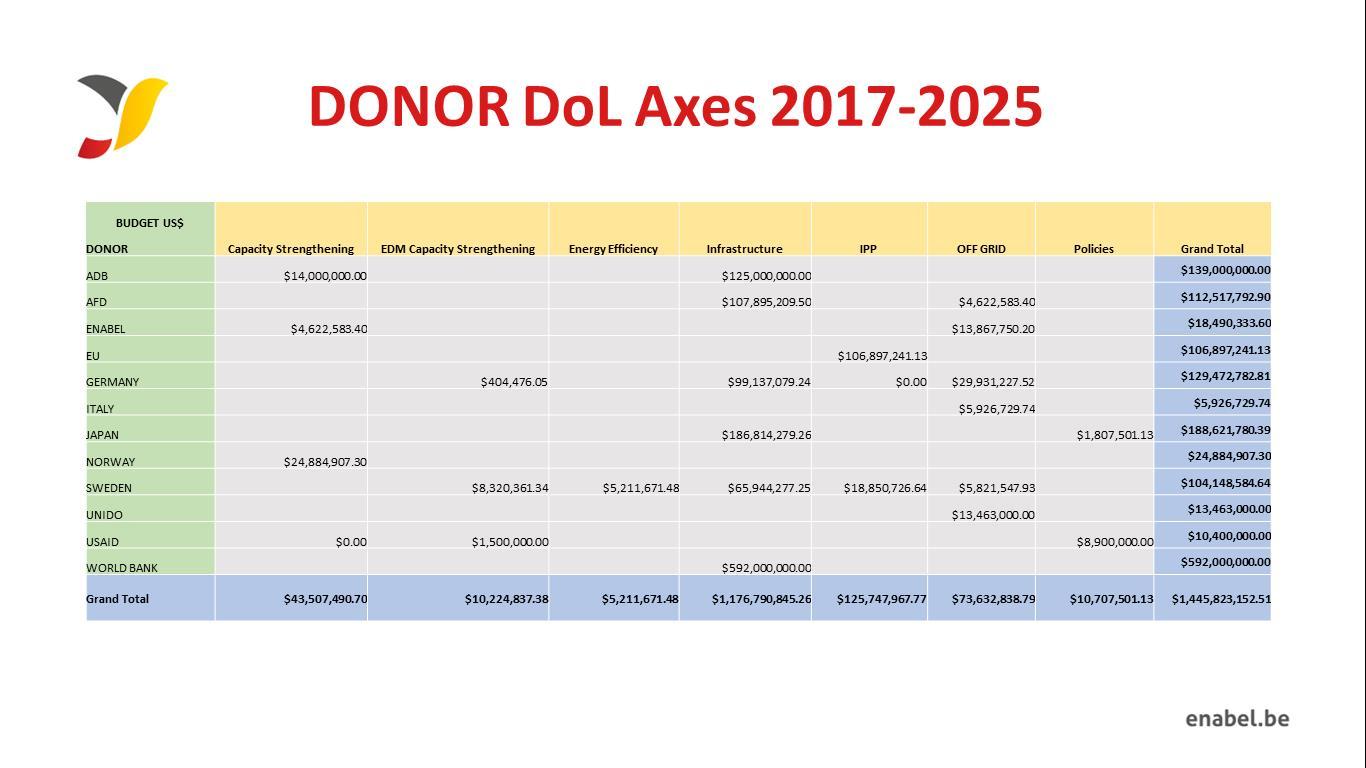
Strengthening coordination in the supply and demand of aid to Mozambique’s energy sector
Anke VANDEVELDE | 11/01/2019
Strengthening coordination in the supply and demand of aid to Mozambique’s energy sector By E.Waeterloos and A.Van de Velde, Enabel Mozambique Over the past years the energy sector in Mozambique has gone through various transitions. This changing context has created new challenges and affected the responsibilities, needs and resources of key stakeholders. With various new donors providing assistance to the energy sector, possible overlaps and complementarities need to be reconsidered. Enabel supports some of Mozambique’s most important governmental actors to build their institutional and operational capacity and to stimulate complementarity, coordination and even division of labour[1] among international and local stakeholders. An evolving sector End 2017, HE E.M. Tonela was appointed as new Minister of Mineral Resources and Energy. As economist and previous board member of the Hidroelectrica de Cahora Bassa (HCB), Mr. Tonela brings expertise from the private energy sector. In December 2017, the new Energy Regulatory Authority (ARENE) replaced the previous advisory CNELEC and is now responsible for the supervision and regulation of production, transport, distribution, commercialization and storage of electricity from any source of energy. Moreover, in 2018 a range of new energy polices has been developed. The adoption of the National Electrification Strategy (ENE) was an important step in Mozambique’s strategy to achieve universal access to electricity by 2030 and clearly identifies the three main challenges in achieving this: institutional (lack of planning and coordination), financial (operating and connecting costs) and technical (reliability of the system). In October 2018, the Mozambican government also approved the Integrated Master Plan for electricity infrastructure. It is an ambitious plan aimed at increasing the country’s capacity to generate, consume and export electricity over the next quarter of a century. Furthermore, the Electricity Law of 1997 is under revision and aims to promote the efficiency of the electricity sector, encourage greater participation of the private sector and establish tariff mechanisms. Lastly, the discovery of immense natural gas and oil reserves a decade ago may improve the country’s macro-economic situation and living standards of the population, but at the same time triggered poor government decisions leading to an accumulation of unsustainable levels of debt (secret loans) and strained donor relations. In short, the energy sector in Mozambique evolves in different dimensions in terms of supply and demand of renewable and non-renewable energy. These changes lead to a situation in which the various key national and international stakeholders need to adapt to their new roles and set up better coordination mechanisms. Surveying aid supply and demand in the sector The technical assistance provided through Enabel’s capacity building project “CB MIREME” supports the Ministry of Mineral Resources and Energy (MIREME), its provincial directorates (DIPREME) and ARENE to cope better with their new role, responsibilities and the changing context. Early in 2018, MIREME formulated an urgent demand through the Energy Sector Working Group (ESWG) - the donor-government policy dialogue and interface platform - to obtain an updated overview of donor activities and commitments in the electric energy sector and to explore possibilities for better coordination. Enabel collected data through a structured questionnaire between the 14th of June and the 23rd of July 2018. Through the ESWG, 22 potential donors were contacted of which more than half (14) eventually responded. The objective of this snap survey is to improve planning, alignment, and coordination between the Mozambican government, donors, and other key partners. A preliminary analysis was presented at the donor coordination meeting on the 5th of July 2018, organized and financed by Enabel in collaboration with MIREME and ESWG. This brief summarizes the most important findings of the final analysis.For the period 2017 to 2025, 12 donors reported 45 projects earmarked for Mozambique’s energy sector with a total reported financial supply of almost US$ 1.5 billion. Twenty five projects are already operational, while 19 have not yet been signed and are still in the pipeline. This means that with an equivalent of almost US$ 900 million, the majority of funding between 2017 and 2025 is not yet formally committed. These donor interventions are situated in a variety of areas, with investment in grid infrastructure (US$1.2 billion) and the promotion of independent power producers (IPP) (US$ 126 million) as frontrunners. The other intervention areas are in order of importance: promotion of off-grid technologies, general capacity strengthening of the sector’s actors, capacity strengthening of the government-owned utility responsible for generation, transmission and distribution of electricity through the national grid EDM, support to the development of sector policies and strategies, and the promotion of energy efficiency. Sweden has the most diverse portfolio with 10 projects in five of the seven intervention areas and is the main sponsor of capacity strengthening in EDM, as well as the only donor investing in energy efficiency. The World Bank on the other hand, invests its entire budget in four projects of building grid infrastructure, while the EU focuses solely on the promotion of independent power producers. Norway is the biggest investor in the area of the sector’s general capacity strengthening, while Germany is the donor with the biggest investments in the off-grid axis; USAID focuses mainly on policies. The general pattern of flow of funds shows a peak in 2019 – 2020 (US$ 215 - 261 million) but no commitments planned after 2023.As to the demand side of aid, the data collected from donors does not allow an analysis of each and every recipient individually. The importance of energy actors in terms of donor funds received can, however, be determined through an approximation. A donor can reach several recipients in one single intervention. Therefore, the only approximation of funds channelled to individual recipients possible is by allocating each and every time the project’s total financial volume to each recipient listed in an intervention. Such cumulating of funds obviously results in double counting in absolute terms, but provides at least a relative weight of every recipient in the total energy sectors’ funding basket. This can be explained by the case of EDM: EDM receives the highest financial attention between 2017-25, both in absolute terms where at least US$ 654 million are directly foreseen for EDM, as in relative terms, where donor projects which support (among others) EDM cumulatively amount to US$ 1.3 billion out of a cumulative US$ 2.6 billion. In the same approximation, projects which support the private sector combine to a total of US$ 400 million. In relative perspective, FUNAE and MIREME both get considerably less attention (respectively US$ 233 million and 260 million). However, it is especially remarkable that the new energy regulator ARENE, civil society and provincial MIREME directorates (DIPREME) receive less than 2% of the approximation’s total funding volume of US$ 2.6 billion. Challenges to coordination in and between aid supply and demand Even though this snap survey lacks detail to identify the exact volume of funds channelled to individual recipients or to highlight overlaps and conflicts between project activities and funds, it does provide a first range of pointers on how to improve coordination among and between donors and recipients. For example, geographical coverage of funding is unequal, with provinces of Maputo, Inhambane and Gaza receiving most project funding and Sofala, Cabo Delgado and Niassa the least. Similar funding inequalities apply to recipient partners (EDM versus ARENE for instance) and intervention areas (grid infrastructure versus energy efficiency). Such analysis can further inform discussions on improved coordination and alignment. The information needs to be further refined in order to fully support discussions on overlaps, conflicts, complementarity and division of labour (DoL). The survey should have a wider coverage and reach out to traditional as well as new donors, include details on aid modalities (e.g. loan or grant), engage in in-depth interviews with each donor to determine overlaps and improved DoL, and triangulate and harmonize information with MIREME and EDM data. It is therefore Enabel’s recommendation to continue in 2019 with more formal and systematic half-yearly information gathering and data management under supervision of, for instance, a team comprising members of the Energy Sector Working Group, MIREME and EDM. Such panel survey complemented with more qualitative in-depth information can support discussions within government and within the ESWG on improved alignment and coordination between and among aid supply and demand. [1] Division of labour (DoL) aims at reducing fragmentation of aid by stimulating coordination and harmonisation among donors, who often concentrate on the same countries and sectors.
-
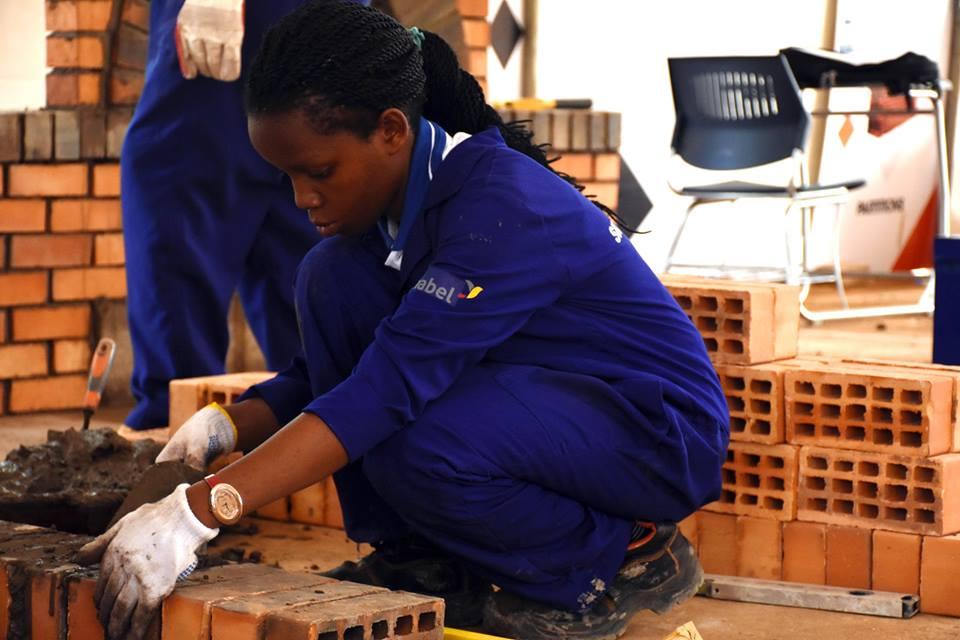
MEET HARNICAH, UGANDA’S CHAMPION BRICKLAYER
William YEKA | 09/01/2019
Nineteen-year-old Harnicah Mpologomy from Uganda smiled as she walked onto the stage of Kigali Convention Centre. She had just won a silver medal in bricklaying and concrete practice at the World Skills Africa Competition. Harnicah caught everybody’s attention when she displayed her skills. People were surprised watching the young girl tussle it out with boys in building walls.“When I chose bricklaying as a career, many people laughed it off,” she said as she mixed cement with sand. “People have a perception that construction is for boys. I want to prove them wrong.”And she did.Two weeks earlier she was crowned Uganda’s bricklaying and concrete practice champion, beating two boys in the final of the national vocational skills competition. She admitted she was afraid when she arrived in Rwanda, particularly when she saw the machines they were supposed to use. She had never worked with such machines before.But she swore to give it her best shot. And it paid off. When receiving her award, she thanked her father, who had encouraged her right from the start. She also revealed her big dream. “In a few years, I plan to start a company which I hope will grow to become as big as Roko,” she said.Harnicah was not the only Ugandan representative who scooped a medal at the African competition. Vincent Muganga, a 21-year-old student of Sand Makers Oil and Gas Institute, won silver in welding, while Rashidah Nambi, a student of Victory School of Beauty, won bronze in the hairdressing category.The competition, the first of its kind in Africa, brought together contestants from Rwanda, Ghana, Morocco, Liberia, Kenya and Uganda. Enabel facilitated the participants in both the national and continental competitions. World Skills is a global initiative that aims to inspire young people to develop a passion for skills and strife for excellence. The progamme sets global training standards and bench marks, and promotes cooperation with the relevant industries.
-
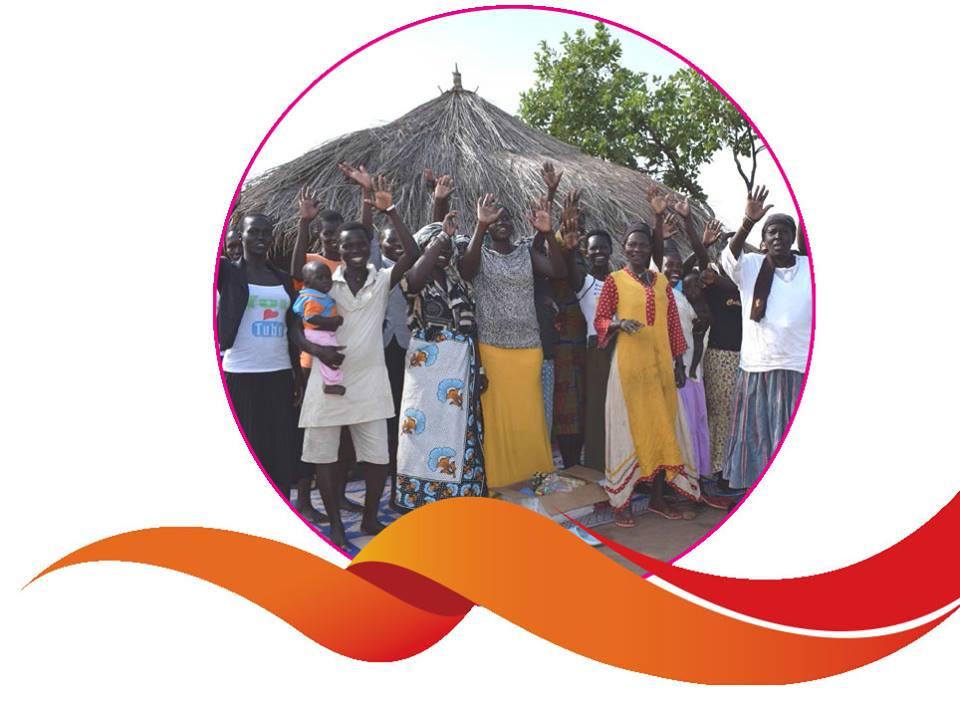
ENABEL SUPPORTS REFUGEES TO START SOAP BUSINESSES
William YEKA | 09/01/2019
In 2016, when conflict broke out again in her country South Sudan, Josephine decided she had to escape. After a long journey she arrived at Bidibidi refugee settlement in Northern Uganda. Her situation shortly after changed when Enabel, the Belgian development agency, came into the settlement. The organization helped Josephine to set up Manjoora Women’s group, of which she is the treasurer.Skills training Noting the enormous demand for soap in and around the settlement, Josephine thought this could be a business opportunity. However, she, like the rest of the members, lacked the skills which would enable them make soap. Luckily, Enabel was willing to train them in soap making. This indeed happened days later. “The skills we have been provided with will help us sustain ourselves while at the settlement and when we return to South Sudan,” an excited Josephine says.Starting a soap business The group now plans to start a soap-making business that will serve their Bidibidi settlement. They also want to use this as a platform for providing financial support to other women outside of their group.“After escaping South Sudan, my life is finally changing for the better. Working together with my women’s group to make soap, and being able to trade and sell at the market, gives us a great opportunity to learn new things and to secure some financial stability,” she says. Josephine says the skills she gained from her training have had a transformative effect. Despite being victims of the South Sudan conflict, the group members have put their tragic tales aside to work and support each other in these difficult times.Context Uganda hosts more refugees than any other country in Africa and, with its 270,000 inhabitants, Bidibidi settlement is the largest of its kind in the world.The skills development and entrepreneurship initiative implemented by Enabel acts as a nexus between humanitarian response and development.It focuses on addressing both the short and long-term needs of refugees and host communities by providing them with skills that they can use to get employment and transform their lives.The project, being implemented as part of the bigger Support Programme for Refugee Settlements and Host Communities in Northern Uganda is funded under the European Union Trust Fund for Africa.
-
Un système de suivi évaluation développé d'une manière participative
Said SAHLI | 27/12/2018
Dans la continuité de la mise en œuvre des activités du « Programme d’appui à la gestion de la thématique migratoire » notamment au niveau de ses deux interventions Amuddu et MBI, l’ensemble des partenaires des deux interventions ont contribué à la finalisation de manière conjointe, du système de suivi et évaluation du programme. Dans la perspective d’assurer une gestion axée sur les résultats sensible au genre, le Programme Migration – Enabel a mis en place, en octobre 2018, un système de suivi-évaluation qui permet doublement d’apprécier le degré de mise en œuvre de ses activités et d’analyser les changements significatifs induits par les activités des deux projets. De cette manière, les partenaires ont analysé les activités proposées afin d’atteindre les résultats prévus, les risques et les mesures de réponse appropriées, ainsi que les indicateurs pour mesurer les progrès. En outre, une attention particulière a été donnée aux questions liées à l’équité et genre, rejoignant de fait les objectifs de la Stratégie Genre 2019-2023 d’Enabel. Cela a permis d’identifier concrètement des mesures à prendre en compte afin d’assurer une intégration de l’approche genre au niveau du système de suivi et évaluation, tel que préconisé dans l’objectif 8 de ladite stratégie, mais aussi au niveau de la mise en œuvre de l’intervention, comme prévu dans l’objectif 2. Parallèlement, avec l’appui d’une experte externe en « migration et genre », ce processus ad-hoc de concertation élargie avec les partenaires a contribué à former les équipes sur les questions liées au S&E et à l’approche genre -objectif 4 de la Stratégie Genre, concernant le renforcement des compétences en matière de genre au sein de l’organisation et parmi le personnel, et à intégrer la perspective de genre dans la stratégie d’intervention et le système de suivi et évaluation (objectif 2 de la de Stratégie Genre). A travers ce travail participatif, le système de suivi et évaluation a été peaufiné et les outils de suivi, tels que la matrice de suivi ou les fiches métadonnées, enrichis.
-
Un système de suivi évaluation développé d'une manière participative
Said SAHLI | 27/12/2018
Dans la continuité de la mise en œuvre des activités du « Programme d’appui à la gestion de la thématique migratoire » notamment au niveau de ses deux interventions Amuddu et MBI, l’ensemble des partenaires des deux interventions ont contribué à la finalisation de manière conjointe, du système de suivi et évaluation du programme. Dans la perspective d’assurer une gestion axée sur les résultats sensible au genre, le Programme Migration – Enabel a mis en place, en octobre 2018, un système de suivi-évaluation qui permet doublement d’apprécier le degré de mise en œuvre de ses activités et d’analyser les changements significatifs induits par les activités des deux projets.De cette manière, les partenaires ont analysé les activités proposées afin d’atteindre les résultats prévus, les risques et les mesures de réponse appropriées, ainsi que les indicateurs pour mesurer les progrès. En outre, une attention particulière a été donnée aux questions liées à l’équité et genre, rejoignant de fait les objectifs de la Stratégie Genre 2019-2023 d’Enabel. Cela a permis d’identifier concrètement des mesures à prendre en compte afin d’assurer une intégration de l’approche genre au niveau du système de suivi et évaluation, tel que préconisé dans l’objectif 8 de ladite stratégie, mais aussi au niveau de la mise en œuvre de l’intervention, comme prévu dans l’objectif 2.Parallèlement, avec l’appui d’une experte externe en « migration et genre », ce processus ad-hoc de concertation élargie avec les partenaires a contribué à former les équipes sur les questions liées au S&E et à l’approche genre -objectif 4 de la Stratégie Genre, concernant le renforcement des compétences en matière de genre au sein de l’organisation et parmi le personnel, et à intégrer la perspective de genre dans la stratégie d’intervention et le système de suivi et évaluation (objectif 2 de la de Stratégie Genre). A travers ce travail participatif, le système de suivi et évaluation a été peaufiné et les outils de suivi, tels que la matrice de suivi ou les fiches métadonnées, enrichis.
